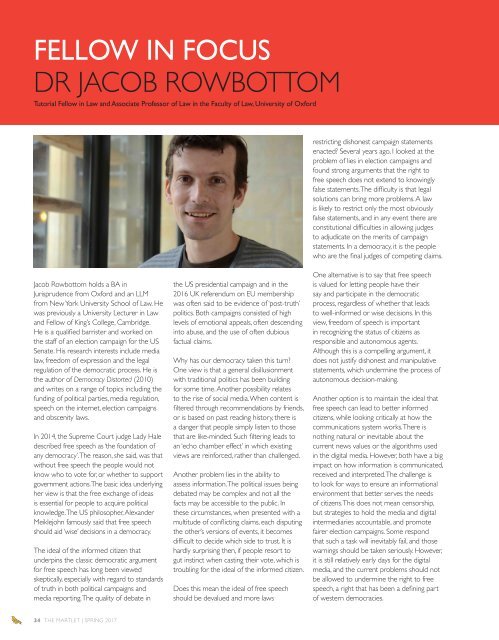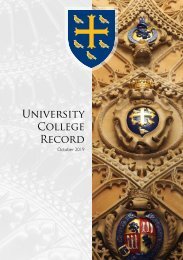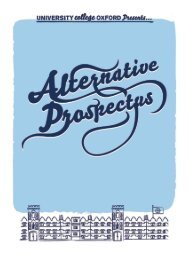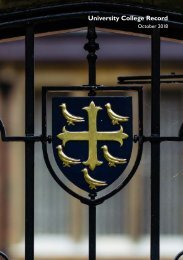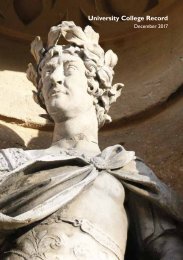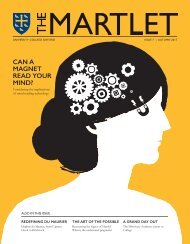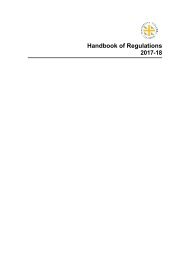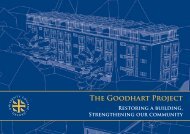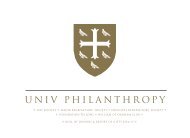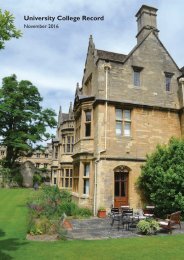Spring Martlet 2017
Spring Martlet 2017 V2
Spring Martlet 2017 V2
- No tags were found...
You also want an ePaper? Increase the reach of your titles
YUMPU automatically turns print PDFs into web optimized ePapers that Google loves.
FELLOW IN FOCUS<br />
DR JACOB ROWBOTTOM<br />
Tutorial Fellow in Law and Associate Professor of Law in the Faculty of Law, University of Oxford<br />
restricting dishonest campaign statements<br />
enacted? Several years ago, I looked at the<br />
problem of lies in election campaigns and<br />
found strong arguments that the right to<br />
free speech does not extend to knowingly<br />
false statements. The difficulty is that legal<br />
solutions can bring more problems. A law<br />
is likely to restrict only the most obviously<br />
false statements, and in any event there are<br />
constitutional difficulties in allowing judges<br />
to adjudicate on the merits of campaign<br />
statements. In a democracy, it is the people<br />
who are the final judges of competing claims.<br />
Jacob Rowbottom holds a BA in<br />
Jurisprudence from Oxford and an LLM<br />
from New York University School of Law. He<br />
was previously a University Lecturer in Law<br />
and Fellow of King’s College, Cambridge.<br />
He is a qualified barrister and worked on<br />
the staff of an election campaign for the US<br />
Senate. His research interests include media<br />
law, freedom of expression and the legal<br />
regulation of the democratic process. He is<br />
the author of Democracy Distorted (2010)<br />
and writes on a range of topics including the<br />
funding of political parties, media regulation,<br />
speech on the internet, election campaigns<br />
and obscenity laws.<br />
In 2014, the Supreme Court judge Lady Hale<br />
described free speech as ‘the foundation of<br />
any democracy’. The reason, she said, was that<br />
without free speech the people would not<br />
know who to vote for, or whether to support<br />
government actions. The basic idea underlying<br />
her view is that the free exchange of ideas<br />
is essential for people to acquire political<br />
knowledge. The US philosopher, Alexander<br />
Meiklejohn famously said that free speech<br />
should aid ‘wise’ decisions in a democracy.<br />
The ideal of the informed citizen that<br />
underpins the classic democratic argument<br />
for free speech has long been viewed<br />
skeptically, especially with regard to standards<br />
of truth in both political campaigns and<br />
media reporting. The quality of debate in<br />
the US presidential campaign and in the<br />
2016 UK referendum on EU membership<br />
was often said to be evidence of ‘post-truth’<br />
politics. Both campaigns consisted of high<br />
levels of emotional appeals, often descending<br />
into abuse, and the use of often dubious<br />
factual claims.<br />
Why has our democracy taken this turn?<br />
One view is that a general disillusionment<br />
with traditional politics has been building<br />
for some time. Another possibility relates<br />
to the rise of social media. When content is<br />
filtered through recommendations by friends,<br />
or is based on past reading history, there is<br />
a danger that people simply listen to those<br />
that are like-minded. Such filtering leads to<br />
an ‘echo chamber effect’ in which existing<br />
views are reinforced, rather than challenged.<br />
Another problem lies in the ability to<br />
assess information. The political issues being<br />
debated may be complex and not all the<br />
facts may be accessible to the public. In<br />
these circumstances, when presented with a<br />
multitude of conflicting claims, each disputing<br />
the other’s versions of events, it becomes<br />
difficult to decide which side to trust. It is<br />
hardly surprising then, if people resort to<br />
gut instinct when casting their vote, which is<br />
troubling for the ideal of the informed citizen.<br />
Does this mean the ideal of free speech<br />
should be devalued and more laws<br />
One alternative is to say that free speech<br />
is valued for letting people have their<br />
say and participate in the democratic<br />
process, regardless of whether that leads<br />
to well-informed or wise decisions. In this<br />
view, freedom of speech is important<br />
in recognizing the status of citizens as<br />
responsible and autonomous agents.<br />
Although this is a compelling argument, it<br />
does not justify dishonest and manipulative<br />
statements, which undermine the process of<br />
autonomous decision-making.<br />
Another option is to maintain the ideal that<br />
free speech can lead to better informed<br />
citizens, while looking critically at how the<br />
communications system works. There is<br />
nothing natural or inevitable about the<br />
current news values or the algorithms used<br />
in the digital media. However, both have a big<br />
impact on how information is communicated,<br />
received and interpreted. The challenge is<br />
to look for ways to ensure an informational<br />
environment that better serves the needs<br />
of citizens. This does not mean censorship,<br />
but strategies to hold the media and digital<br />
intermediaries accountable, and promote<br />
fairer election campaigns. Some respond<br />
that such a task will inevitably fail, and those<br />
warnings should be taken seriously. However,<br />
it is still relatively early days for the digital<br />
media, and the current problems should not<br />
be allowed to undermine the right to free<br />
speech, a right that has been a defining part<br />
of western democracies.<br />
34 THE MARTLET | SPRING <strong>2017</strong>


